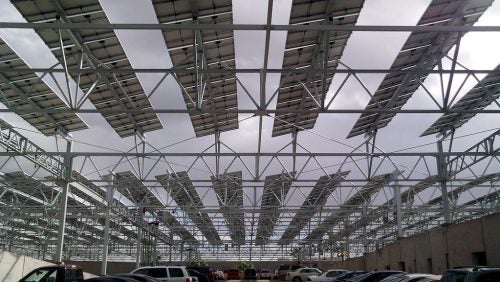The New Emergencies: Tariffs and the Subordination of Climate Policy
April 22, 2025 by Eli Merkadeau

New tariff policies could disrupt efforts to transition to clean energy.
The Trump Administration invoked the International Emergency Economic Powers Act of 1977 to create its new tariff regime. This new trade policy disrupts the clean energy transition and shows how the trade deficit, not climate change, will be treated as an emergency.
On April 2, President Trump announced via Executive Order a regime of “reciprocal tariffs“ purporting to rectify large and persistent annual United States goods trade deficits.”[1] The action was taken under the International Emergency Economic Powers Act of 1977 (IEEPA), with the Trump Administration stating that prior trade and economic practices created a national emergency that warranted the act’s invocation.[2] The initial announcement was for a 10% baseline tariff on all countries, as well as individualized reciprocal tariffs based on trade deficits.[3] On April 9, President Trump announced again, via Executive Order, that the individual tariffs would be paused for 90 days, except for tariffs on China, which were increased.[4]
The longer-term tariff strategy remains unclear, as does its specific impact on climate. The policy swap and escalating trade war with China has led to uncertainty in the stock market and the government bond market,[5] which is likely to have a wide impact across many sectors. Clean tech and climate tech may be hit particularly hard by this volatility and any sustained economic downturn, as funding for emerging carbon removal or other green technologies could become scarcer.[6] Clean energy investors may look to markets outside of the United States, impacting the nation’s ability to remain competitive in clean energy moving forward.[7] Tariffs on Chinese goods, particularly lithium-ion batteries, are expected to increase costs for electric vehicles and other technologies.[8] Solar panels and wind turbines will likely become more expensive because the goods required to manufacture them or the finished products themselves are subject to tariffs.[9]
But climate is not the most fundamental concern for the Trump Administration, which sees trade as a crucial, pressing policy area.[10] In invoking IEEPA, the administration has consistently labeled the current trade situation and its impact on American workers, as an emergency.[11] Of course, concerns with respect to free trade and the environment are not mutually exclusive. Across the political aisle, there is certainly support for using tariffs in different manners to bolster the competitive nature of American producers in specific sectors, such as clean energy.[12] Notably, Senator Bernie Sanders is an example of a proponent of certain tariffs outside the Trump administration.[13] Whether the prior status quo of American free trade policy warranted a full emergency response, or a minor adjustment, could be a question independent of climate policy. However, while the new administration clearly views trade deficits as an emergency, the same cannot be said for climate change.
It is, of course, not news that the second Trump administration will be more aggressive and proactive with respect to its economic agenda than to climate change. Some of the administration’s first actions were to direct the Environmental Protection Agency (EPA) to review and possibly rescind emission standards, electric vehicle mandates, and many other regulations and plans, seeing deregulation as the path to energy independence.[14] The Department of Government Efficiency (DOGE) has worked with EPA Administrator Lee Zeldin to cut significant amounts of EPA contracts and grants.[15]
However, what the latest announcements regarding tariffs demonstrate is that the United States’ environmental policy will largely be dictated by how it intersects with other sweeping actions regarding other, more pressing emergencies. Under this framework, the EPA’s regulatory capacity is less pressing than DOGE’s push for austerity spending, and the transition to clean energy is not even a factor in tariff announcements or pauses. The last few weeks are the latest in what one expects to be a continuing trend of climate action not only lacking “emergency” status but being entirely subordinated by other policy aims.
[1] Exec. Order No. 14257, 90 Fed Reg. 15041 (Apr. 2, 2025).
[2] The White House, Fact Sheet: President Donald J. Trump Declares National Emergency to Increase our Competitive Edge, Protect our Sovereignty, and Strengthen our National and Economic Security (Apr. 2, 2025), https://www.whitehouse.gov/fact-sheets/2025/04/fact-sheet-president-donald-j-trump-declares-national-emergency-to-increase-our-competitive-edge-protect-our-sovereignty-and-strengthen-our-national-and-economic-security/#:~:text=Using%20his%20IEEPA%20authority%2C%20President,at%2012%3A01%20a.m.%20EDT.
[3] Id.
[4] Exec. Order, Modifying Reciprocal Tariff Rates To Reflect Trading Partner Retaliation and Alignment, 2025 WL 1078025.
[5] Jordan Erb, Stocks Resume Decline on Trade War Fear, Bloomberg (Apr. 10, 2025), https://www.bloomberg.com/news/newsletters/2025-04-10/stocks-resume-their-decline-on-trade-war-fear-evening-briefing-americas.
[6] James Temple, Trump’s tariffs will deliver a big blow to climate tech, MIT Tech. Rev. (Apr. 3, 2025), https://www.technologyreview.com/2025/04/03/1114209/trumps-tariffs-will-deliver-a-big-blow-to-climate-tech/.
[7] Jillian Ambrose, Will global climate action be a casualty of Trump’s tariffs?, The Guardian (Apr. 11, 2025), https://www.theguardian.com/environment/2025/apr/11/global-climate-action-casualty-trump-tariffs.
[8] Id.
[9] Benjamin Storrow et al., Trump’s Tariffs Are Expected to Undermine the Clean Energy Transition, Scientific American (Apr. 2, 2025), https://www.scientificamerican.com/article/trumps-tariffs-are-expected-to-undermine-the-clean-energy-transition/.
[10] See, e.g., United States Trade Representative, The President’s 2025 Trade Policy Agenda (Mar. 2025), https://ustr.gov/sites/default/files/files/reports/2025/President%20Trump’s%202025%20Trade%20Policy%20Agenda.pdf.
[11] See, e.g., Exec. Order No. 14257.
[12] See, e.g., Katie Lobosco, Biden finalizes increases to some of Trump’s China tariffs, CNN (Sep. 13, 2024), https://www.cnn.com/2024/09/13/politics/china-tariffs-biden-trump/index.html.
[13] See, e.g., Press Release, Bernie Sanders, NEWS: Sanders Statement on Trump Tariff Announcement (Apr. 9, 2025), https://www.sanders.senate.gov/press-releases/news-sanders-statement-on-trump-tariff-announcement/.
[14] Exec. Order, Unleashing American Energy, 90 Fed. Reg. 8353.
[15] News Release, EPA Press Office, EPA Administrator Lee Zeldin Cancels 400+ Grants in 4th Round of Cuts with DOGE, Saving Americans More than $1.7B (Mar. 10, 2025), https://www.epa.gov/newsreleases/epa-administrator-lee-zeldin-cancels-400-grants-4th-round-cuts-doge-saving-americans.

